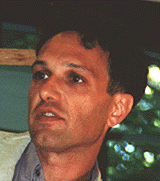Pascal Boyer on neurotheology
 Pascal Boyer is a professor at Washington University in St. Louis, and the author of Religion Explained: The Evolutionary Origins of Religious Thought, and a pre-eminent scholar of human religious behaviors.
Pascal Boyer is a professor at Washington University in St. Louis, and the author of Religion Explained: The Evolutionary Origins of Religious Thought, and a pre-eminent scholar of human religious behaviors.
Boyer is an anthropologist and it is therefore unsurprising that he adopts an anthropological focus in his book; what is startling is its utterly unremitting nature, often of nosebleed-inducing intensity.
Boyer debunks most existing theories of religion, and proposes that religions exist because they successfully recruit a variety of low-level systems in the human brain, such as for agent detection, social exchange, knowledge attribution, death management, and attention to the unusual. He views religion not as a source of morality, but rather a convenient canvas on which people project their own folk morality.
This is the most interesting book I have read in some time, and I recommend it highly. What the author has to say is important and well worth examining, hence this rather long post. However, I can’t agree with the author’s thoughts on neurotheology, of which, predictably, he is scathingly critical.
Deep religious experience
I first thought Boyer was never going to get around to talking about deep religious experience. Not until the final chapter, “Why Belief?”, does he address what he calls “exceptional mental events” and “extreme episodes that people usually interpret in religious terms”, bringing in William James’ theory that the everyday religion of the masses is a degraded form of the special experience of mystics and visionaries, which he wastes no time poking fun at:
In this view, the notion of an invisible supernatural agent, or of a soul being around after the body is dead, or of unconscious zombies remote controlled by witches, or of extra organs flying about on banana leaves, all this was first created by some gifted individuals with intense experience.
Neurotheology
He then begins an anti-neurotheology rant, condescendingly attributing the interest in the neuroimaging of religious experience to the fact that scientists find it more “exciting” to measure what’s happening in a meditator’s brain than some other, more pedestrian, cognitive process. He criticizes the approach of neuroimaging advanced practitioners, whom he derides as “religious specialists” and “virtuosos”, claiming unconvincingly that this is a fixation resulting from “creeping Jamesian assumptions” and based on unvalidated suppositions that “there is some religious center in the brain” or that religious experiences are “special”.
Well, no. If I want to study mathematical reasoning and the brain, it makes perfect sense to take mathematicians as my subjects. And neurotheology researchers do not insist in advance of their experiments that there is a “God circuit” in the brain (OK, maybe some do, or maybe some have that as a hypothesis, but having hypotheses is what science is about).
But after gleefully picking apart his straw-man versions of both advanced religious experience and the field of neurotheology, he suddenly changes gears on us:
That people can experience a sudden feeling of peace, of communion with tthe entire-world…can be to some extent correlated with particular brain activity…it is plausible that such experience stems from a particular activiation of cortical areas that handle thoughts about other people’s thoughts and those that create emotional responses to people’s presence.
But that is exactly what people studying neurotheology are trying to find out.
What’s missing
There is another major missing piece, however. Boyer’s worldview completely lacks any notion of “development” in the individual, notably development which brings improved behaviors that are more successful for that individual. Such development, although admittedly hard to define, is by definition associated with certain changes in brain structure. Certain types of religious experiences or practices, which also by definition involve neural modifications, can be reasonably judged to promote individual development in the sense above. We thus have perhaps the primary hypothesis in the budding field of neurotheology: religious experience or practice and the evolution of the individual are connected by means of the associated neural changes. Our job is to find the nature of that connection.

February 11th, 2006 at 08:59
Glad to come across your site since am going back in my mind over relgion in general terms while muddling over the Mohammed Cartoons imbloglio.
Ben Goertzel does a good job on running through Boyer – at least it is jargon free and therefore more widely accessible:
http://www.goertzel.org/dynapsyc/2002/ReligionNotExplained.htm
Found also : Religion Explained, A Review
Dan Schneider
http://www.cosmoetica.com/B99-DES54.htm
which am in the middle of.
March 26th, 2006 at 13:47
The review says “religious experience or practice and the evolution of the individual are connected by means of the associated neural changes. Our job is to find the nature of that connection.”
Why. All human emotion, from anquish to contentment has corolates with neural phenomona. What would be gained by having a complete map of the cerebrial areas and their energy uptake?
I believe it was William James, or maybe Freud who described the oceanac sensation, of a person being at one with the world. Does it matter if we understand the biological underpinnings.
I consider myself a radical rationalist, yet I would not deny feelings of transcendence, or intense spiritualism. I accept the perception but not the reality of attribution to a supernatural entity.
And the feeling which can inspire one to courage to face social evils, or courage to perpetrate them, is worthy of studying.
Do you really think that the process of mathematical reasoning can ever be elucidated by looking at brain processes. I doubt it, at least in this millenium.
December 3rd, 2006 at 11:29
On must think very, very much of himself when thinking ‘I explain the religion’.
French people call this kind of thinking ‘masturbation intellectuelle’.
Only in America one can make this kind of ‘science’ of religion.
flute